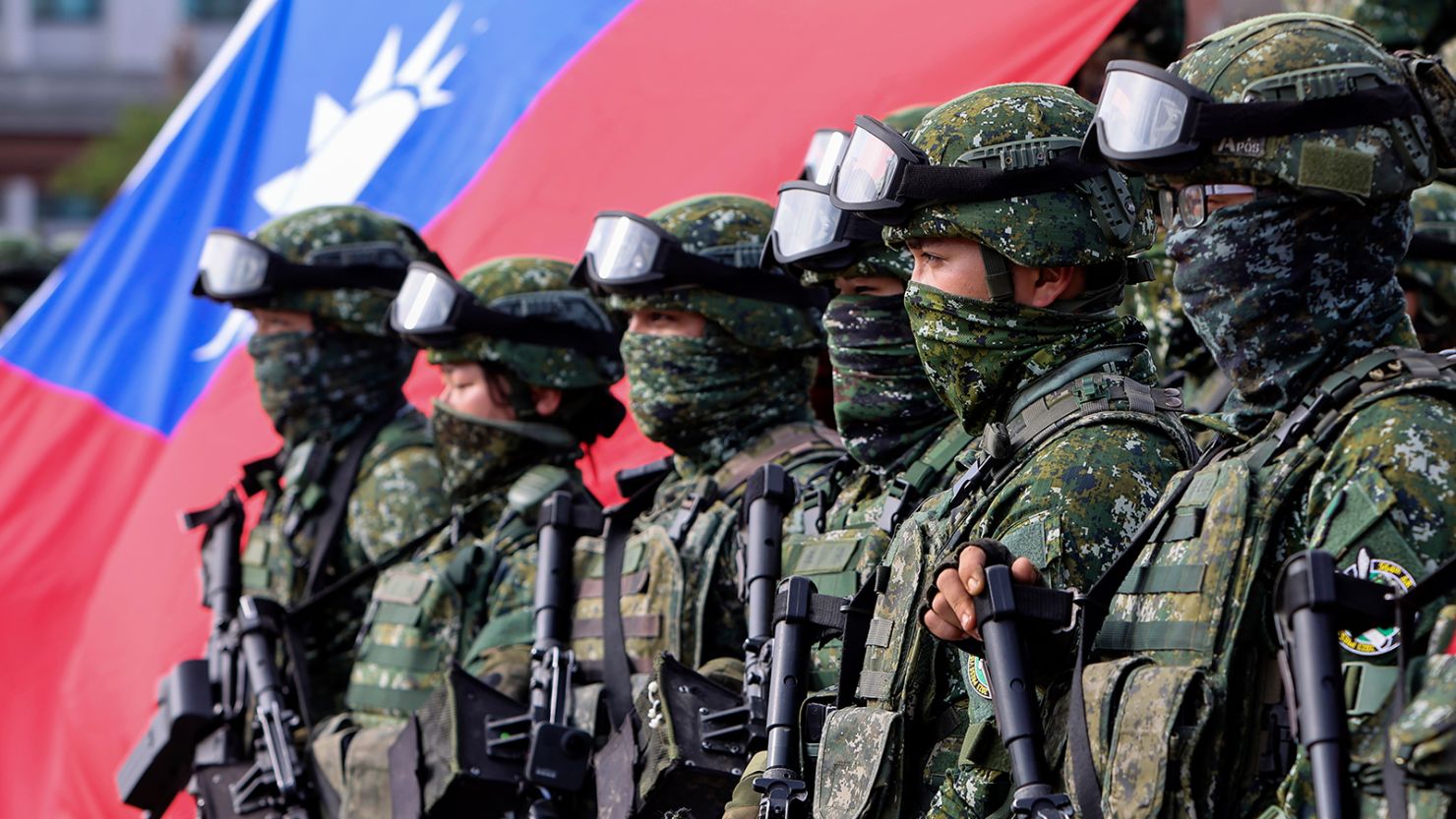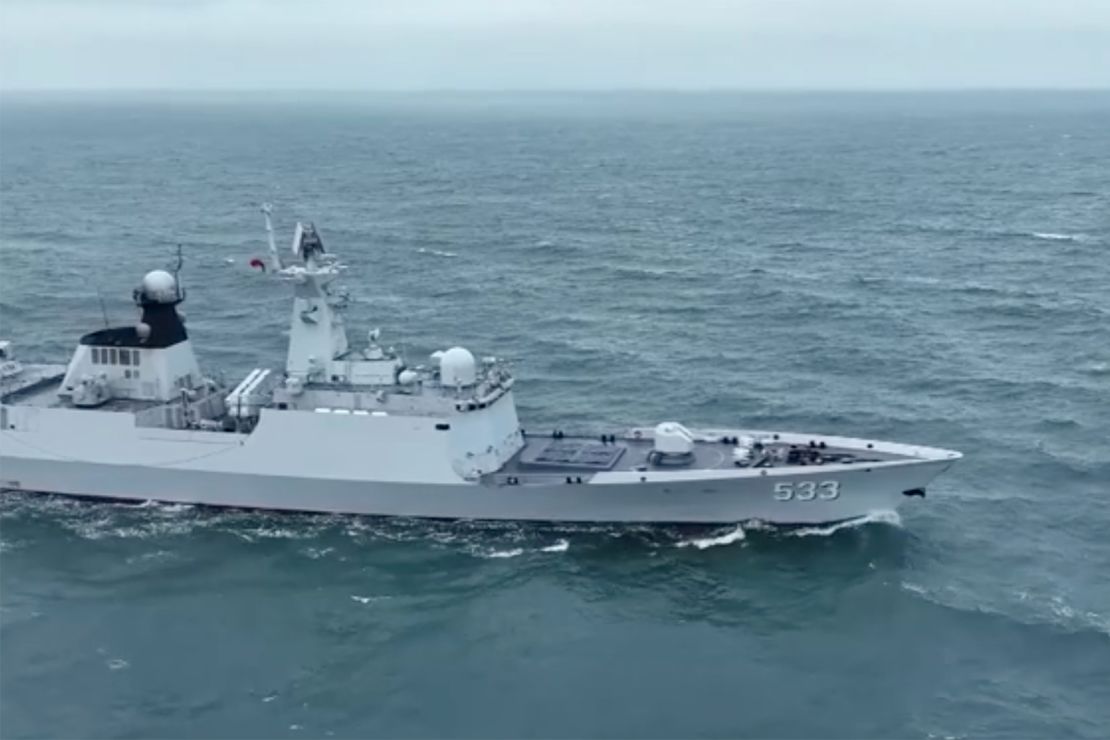

By Jessie Yeung and Nectar Gan, CNN
Updated 4:23 AM EDT, Thu May 23, 2024

Soldiers pose for group photos with a Taiwan flag after a preparedness enhancement drill simulating the defense against Beijing’s military intrusions in Kaohsiung City, Taiwan on January 11, 2023. Daniel Ceng/APCNN —
Tensions are once again ratcheting up in the Taiwan Strait, with China launching military drills encircling Taiwan just days after the democracy swore in a new leader long loathed by Beijing.
The exercises began early Thursday, in what China described as “punishment” for “separatist acts” – alluding to the election and inauguration of the self-governing island’s new President Lai Ching-te.
Though relations between the two sides have been steadily worsening in recent years, this latest escalation marks a significant test for Taiwan’s new leader, whose ruling party has championed democracy in the face of growing threats from its authoritarian superpower neighbor.
China’s ruling Communist Party says Taiwan is part of its territory, despite never having controlled it, and has vowed to take the island, by force if necessary. And it has become much more bellicose under Chinese leader Xi Jinping.
Here’s what you need to know.
What’s happening with the drills?
The Eastern Theater Command of the Chinese People’s Liberation Army (PLA) said it launched joint military drills involving the army, navy, air force and rocket force in areas around Taiwan early Thursday morning.
The drills are being conducted in the Taiwan Strait – a narrow body of water separating the self-ruling island with mainland China – as well as north, south and east of Taiwan.
They are also taking place in areas around Taiwan’s outlying islands of Kinmen, Matsu, Wuqiu and Dongyin, located just off China’s southeastern coast, the command said in a statement.

The Chinese guided missile frigate Nantong, one of the vessels in the series of military drills around Taiwan. People’s Liberation Army/Weibo
Naval Colonel Li Xi, spokesperson for the command, called the exercises “a strong punishment for the separatist acts of Taiwan independence forces and a serious warning against interference and provocation by external forces.”
China’s military drills are often as much about playing to a domestic audience as signaling intentions internationally. Chinese state media heavily covered Thursday’s drills while the military also posted footage of one of its vessels on social media. The exercises subsequently went viral on China’s heavily regulated internet.
Taiwan’s Defense Ministry said in a statement it had dispatched sea, air and ground forces to respond to China’s drills. It expressed regret to “such irrational provocations and actions that undermine regional peace and stability.”
The island’s presidential office said in a statement that it was “confident and capable of defending national security,” accusing China of “using unilateral military provocation to threaten Taiwan’s democracy and freedom.”
What triggered this?
The most obvious answer is Lai’s inauguration on Monday.
Lai’s Democratic Progressive Party (DPP), now in power for a historic third term, views Taiwan as a de facto sovereign nation with a distinct Taiwanese identity.
Ahead of Taiwan’s elections back in January, Beijing had warned that a Lai victory could inflame tensions and spark conflict – repeatedly framing the vote as a choice between “peace and war.”
Taiwanese voters dismissed those warnings, returning the DPP to power – although two opposition parties that favor closer ties with China now have a majority in parliament.
China’s government and state media regularly rebuke Lai, calling him a dangerous separatist, “troublemaker” and “war maker,” while rejecting his repeated offer of talks.

Taiwan’s new President Lai Ching-te and his wife Wu Mei-ju wave during the inauguration ceremony in Taipei on May 20, 2024. Carlos Garcia Rawlins/Reuters
Their vehement dislike of Lai is rooted in his political past, as well as Beijing’s refusal to deal directly with a huge swathe of Taiwan’s leaders.
The 64-year-old former doctor and political veteran was once an open supporter of Taiwan independence – a red line for Beijing.
His views have tempered over the years, and he now says he favors the current status quo, saying there is “no plan or need” to declare independence since the island is “already an independent sovereign country.”
But Beijing has never forgiven him for those early comments – making its stance clear with the drills on Thursday.
Lai, too, has set the tone for his new administration’s approach to China – using his inaugural speech on Monday to declare that a “glorious era of Taiwan’s democracy has arrived,” and reiterating a determination to defend its sovereignty.
He also called on Beijing to cease its “intimidation” of Taiwan and respect that its people want to decide their own destiny.
What’s the relationship between China and Taiwan?
The bloody Chinese Civil War ended with the Chinese Communist Party (CCP) taking power in the mainland, establishing the People’s Republic of China (PRC) in Beijing in 1949.
The defeated Nationalist Party fled to Taiwan, moving the seat of their Republic of China (ROC) government from the mainland to Taipei.
Both proclaimed themselves the sole rightful government of the entire Chinese territory.
In recent years, Taiwan has downplayed its territorial claims over mainland China, and is today a vibrant democracy, with its own military, currency, constitution and elected government.

But it is not recognized as an independent country by most governments in the world. Over the decades it has become increasingly isolated diplomatically – with an increasing number of governments switching their diplomatic recognition from Taipei to Beijing. But unofficial diplomatic ties with many Western nations have in fact been bolstered in recent years, in part thanks to China’s sabre-rattling.
Meanwhile, under Xi, China has become increasingly assertive in foreign policy and grown more authoritarian at home.
China has cut official communication with Taiwan since the the DPP took office in 2016, and has ramped up economic, military and diplomatic pressure on the island.
At the same time, ties between Taipei and Washington have become more robust, with increased arms sales and high-level political engagement under Lai’s popular predecessor Tsai Ing-wen. This has infuriated Beijing, spurring it to unleash more pressure on Taiwan and sending cross-strait relations on a downward spiral.
Where does the US stand in this?
The US formally switched diplomatic recognition from Taipei to Beijing in 1979 – but has long trod a delicate middle path.
In what is known as the “One China” policy, Washington recognizes the People’s Republic of China as the sole legitimate government of China; it also acknowledges Beijing’s position that Taiwan is part of China, but has never accepted the Chinese Communist Party’s claim of sovereignty over the island.
The US maintains close unofficial ties with Taiwan, which have been strengthened in recent years. It is bound by law to provide the democratic island with the means to defend itself, and supplies the island with defensive weaponry.
American lawmakers regularly visit Taiwan and have supported legislation to bolster US support for the island and its defensive capabilities.
But it has historically remained deliberately vague on whether it would defend Taiwan in case of a Chinese invasion, a policy known as “strategic ambiguity.”
After the island’s election in January, the US sent an bipartisan delegation to Taiwan, where they met with Lai and Tsai – and promised that American support for Taiwan will continue no matter who wins the upcoming US election.
Beijing on Tuesday also announced sanctions against former US House Representative Mike Gallagher, who led that delegation, citing his “remarks and actions” that “interfere” in China’s internal affairs.
